|
|
Culture of Empathy
Builder:
Marshall Rosenberg Quotes

“All that has
been integrated into NVC has been known for centuries about
consciousness, language, communication skills, and use of power that
enable us to maintain a perspective of empathy for ourselves and others,
even under trying conditions.” - Marshall B. Rosenberg
"We need to receive empathy to give empathy." Marshall Rosenberg
Time and
again, people transcend the paralyzing effects of psychological pain
when they have sufficient contact with someone who can hear them
empathically.
Marshall B.
Rosenberg
if my pain is too great I can't empathize. So, I might
say, "I'm in so much pain right now hearing some things you've said, I'm
not able to listen."" Marshall Rosenberg
"If you think ahead to what to say next - like how to fix it or make the
person feel better - BOOM! Off the board. You're into the future.
Empathy requires staying with the energy that's here right now. Not
using any technique. Just being present. When I have really connected to
this energy, it's like I wasn't there. I call this "watching the magic
show". In this presence, a very precious energy works through us that
can heal anything, and this relieves me from my "fix-it" tendencies." -
Marshall Rosenberg
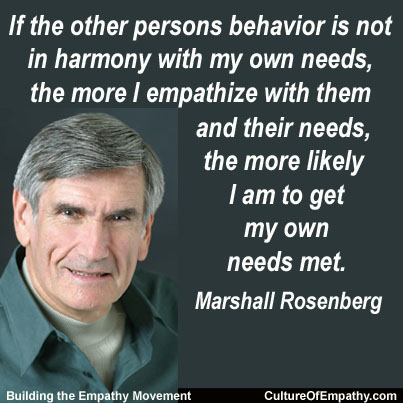 |
|
"If
the other persons behavior is not in harmony with my own needs, the more I
empathize with them and their needs, the more likely I am to get me own
needs met." Marshall Rosenberg
|
sympathy
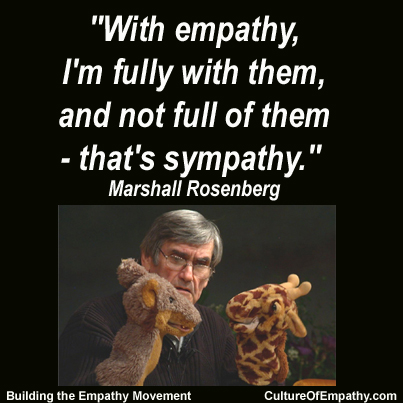 |
|
"With
empathy, I'm fully with them, and not full of them - that's
sympathy." Marshall Rosenberg |
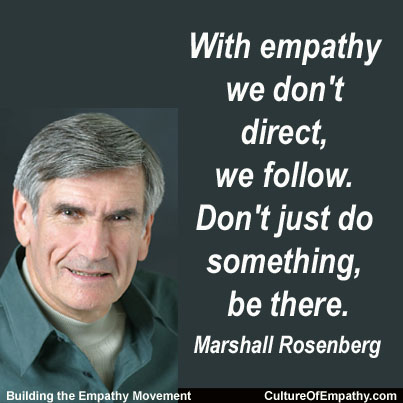 |
|
"With
empathy we don't direct, we follow. Don't just do something, be
there." Marshall Rosenberg |
Blocks,
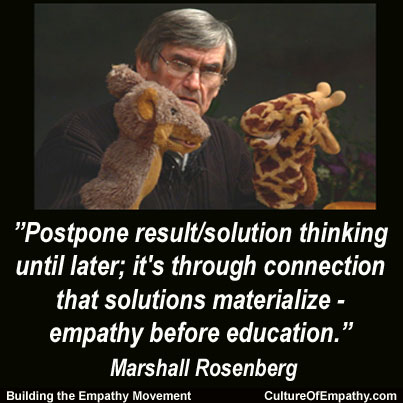 |
|
"Postpone
result/solution thinking until later; it's through connection that
solutions materialize - empathy before education."
Marshall Rosenberg |
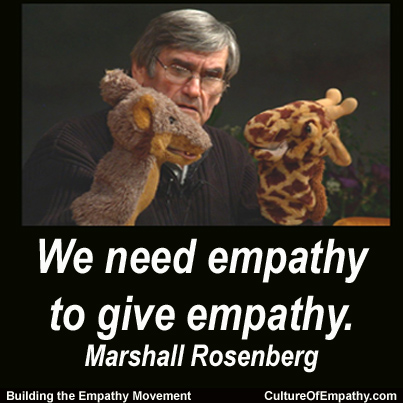 |
|
We
need to receive empathy to give empathy." Marshall Rosenberg |
Depression
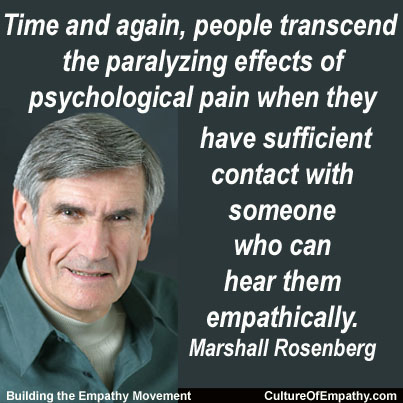 |
|
"Time and
again, people transcend the paralyzing effects of psychological pain when
they have sufficient contact with someone who can hear them empathically."
Marshall Rosenberg
|
Power, Status
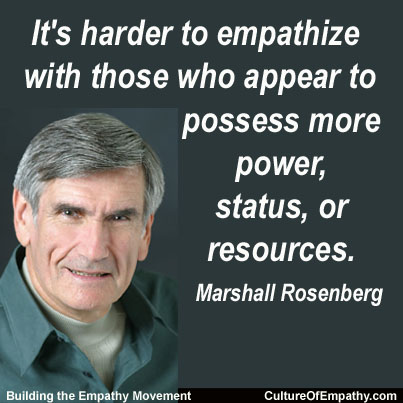 |
|
"It's
harder to empathize with those who appear to possess more power, status,
or resources." Marshall Rosenberg |
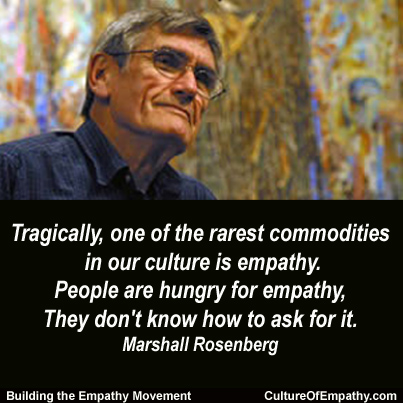 |
|
Tragically,
one of the rarest commodities in our culture is empathy. People are hungry
for empathy, They don't know how to ask for it." Marshall B. Rosenberg, |
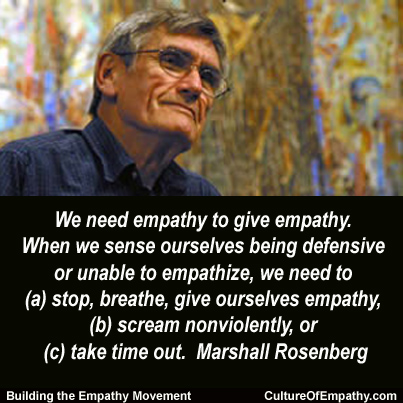 |
|
"We need
empathy to give empathy. When we sense ourselves being defensive or unable
to empathize, we need to
(a) stop, breathe, give ourselves empathy,
(b) scream nonviolently,
or (c) take time out."
Marshall B. Rosenberg, Non-Violent Communication |
self-judgments
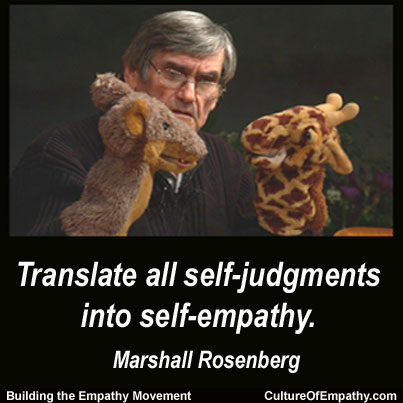 |
|
"Translate
all self-judgments into self-empathy." Marshall B. Rosenberg, |
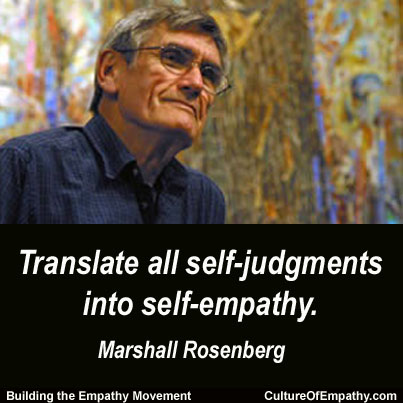 |
|
"Translate all self-judgments into self-empathy." Marshall B. Rosenberg, |
Intellectual understanding
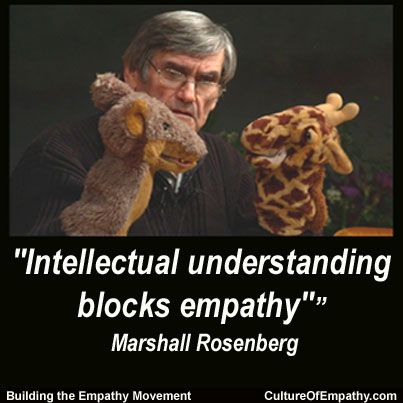 |
|
"Intellectual
understanding blocks empathy." Marshall Rosenberg |
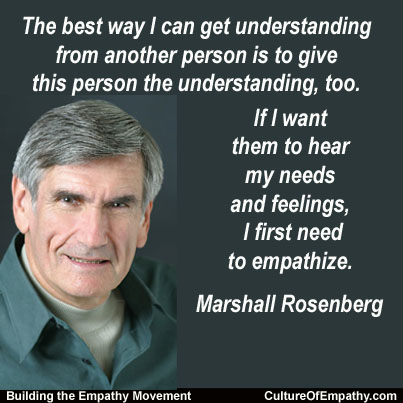 |
|
"The best
way I can get understanding from another person is to give this person the
understanding, too. If I want them to hear my needs and feelings, I first
need to empathize." Marshall Rosenberg |
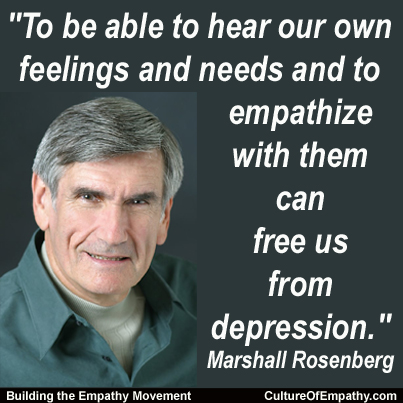 |
|
"To be
able to hear our own feelings and needs and to empathize with them can
free us from depression."
Marshall Rosenberg |
peace
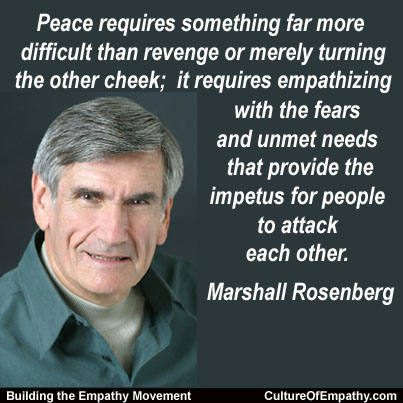 |
|
"Peace
requires something far more difficult than revenge or merely turning the
other cheek; it requires empathizing with the fears and unmet needs that
provide the impetus for people to attack each other.
Being aware of
those feelings and needs, people lose their desires to attack back because
they see the human ignorance leading to those attacks.
Instead,
their goal becomes providing the empathic connection and education that
will enable them to transcend their violence and engage in cooperative
relationships.'" Marshall Rosenberg
|
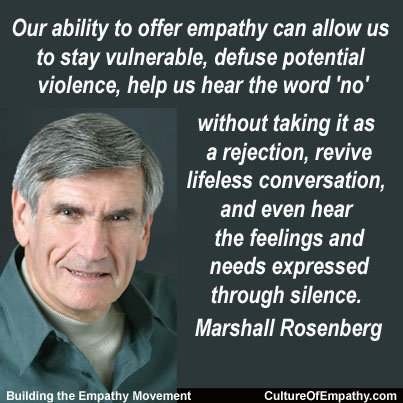 |
|
"Our ability to offer empathy can allow us to stay vulnerable, defuse
potential violence, help us hear the word 'no' without taking it as a
rejection, revive lifeless conversation, and even hear the feelings and
needs expressed through silence." Marshall Rosenberg |
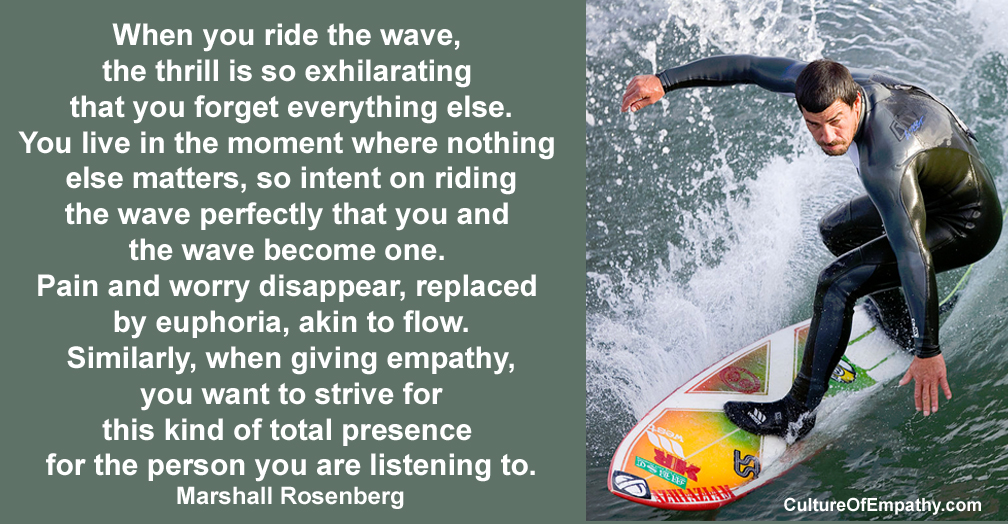
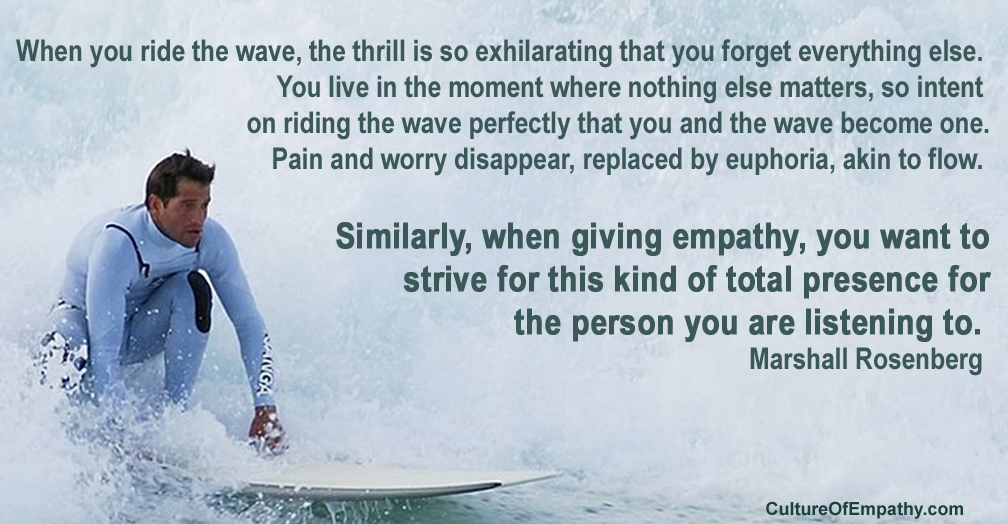 |
|
When you ride the wave, the thrill is so exhilarating that you forget
everything else. You live in the moment where nothing else matters, so
intent on riding the wave perfectly that you and the wave become one.
Pain and worry disappear, replaced by euphoria, akin to flow. Similarly,
when giving empathy, you want to strive for this kind of total presence
for the person you are listening to.
Marshall Rosenberg image source |
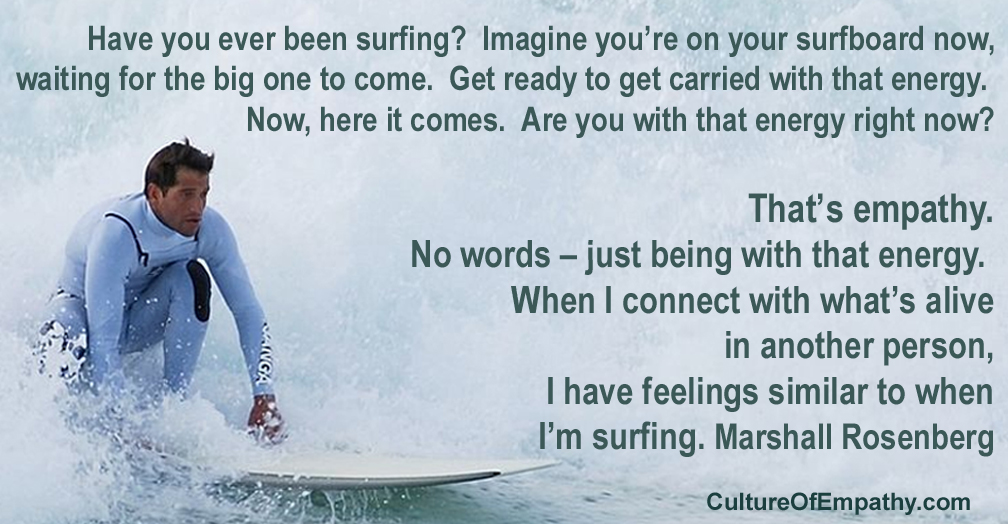 |
|
Have you ever been
surfing? Imagine you’re on your surfboard now, waiting for the big one to
come. Get ready to get carried with that energy. Now, here it comes. Are
you with that energy right now? That’s empathy. No words – just being with
that energy. When I connect with what’s alive in another person, I have
feelings similar to when I’m surfing. Marshall Rosenberg
image source |
"The objective
of Nonviolent Communication is not to change people and their behavior
in order to get our way: it is to establish relationships based on
honesty and empathy, which will eventually fulfill everyone’s needs."
— Marshall Rosenberg
"Empathy with
others occurs only when we have successfully shed all preconceived ideas
and judgments about them. The Austrian-born Israeli philosopher Martin
Buber describes this quality of presence that life demands of us: "In
site of all similarities, every living situation has, like a newborn
child, a new face, that has never been before and will never come again.
It demands nothing of you a reaction that cannot be prepared beforehand.
It demands nothing of what is past. IT demands presence, responsibility:
it demands you." "
Marshall B. Rosenberg, Non-Violent Communication
"Instead of
empathy, we tend instead to have a strong urge to give advice or
reassurance and to explain our own position or feeling. Empathy, on the
other hand, requires focusing full attention on the other person's
message. We give others the time and space they need to express
themselves fully and to feel understood."
Marshall B. Rosenberg, Non-Violent Communication
What evidence is
there that we've adequately empathized with the other person?
-
First,
when an individual realizes that everything going on within has received
full empathic understanding, they will experience a sense of relief. We
can become aware of this phenomenon by noticing a corresponding release
of tension in our own body.
-
A second even more obvious sign is that the
person will stop talking. If we are uncertain as to whether we have
stayed long enough in the process, we can always ask,
-
"Is there more
that you wanted to say?"
Marshall B. Rosenberg, Non-Violent Communication
"I recommend allowing others the opportunity to fully express themselves
before turning our attention to solutions or requests for relief. When
we proceed too quickly to what people might be requesting, we may not
convey our genuine interest in their feelings and needs; instead, they
may get the impression that we're in a hurry to either be free of them
or to fix their problem. Furthermore, an initial message is often like
the tip of an iceberg; it may be followed by yet unexpressed, but
related - and often more powerful - feelings.
By maintaining our attention on what's going on within others, we offer
them a chance to fully explore and express their interior selves. We
would stem this flow if we were to shift attention too quickly either to
their request or to our own desire to express ourselves."
Marshall B. Rosenberg, Non-Violent Communication
"All that has been integrated into NVC has been known for centuries
about consciousness, language, communication skills, and use of power
that enable us to maintain a perspective of empathy for ourselves and
others, even under trying conditions."- Marshall B. Rosenberg,
”In empathy, you don’t speak at all. You speak with the eyes. You speak
with your body. If you say any words at all, it’s because you are not
sure you are with the person. So you may say some words. But the words
are not empathy. Empathy is when the other person feels the connection
with what’s alive in you. Marshall Rosenberg
“I wouldn't expect someone who's been injured to hear my side until they
felt that I had fully understood the depth of their pain.” Marshall
Rosenberg
”Empathy lies in our ability to be present without opinion.” Marshall
Rosenberg
”Empathy gives you the ability to enjoy another person's pain.” Marshall
Rosenberg
”The more we empathize with the other party, the safer we feel.”
Marshall Rosenberg
Self-empathy in NVC means checking in with your own feelings and needs.
Marshall Rosenberg
”The number one rule of our training is empathy before education. ”
Marshall Rosenberg
”It may be most difficult to empathize with those we are closest to.”
Marshall Rosenberg
”Empathizing with someone's 'no' protects us from taking it personally.”
Marshall Rosenberg
”Empathy is a respectful understanding of what others are experiencing.”
Marshall Rosenberg
”Empathy allows us to re-perceive our world in a new way and move
forward ” Marshall Rosenberg
”With empathy we don't direct, we follow. Don't just do something, be
there.” Marshall Rosenberg
”Our goal is to create a quality of empathic connection that allows
everyone's needs to be met.” Marshall Rosenberg
”Often, instead of offering empathy, we have a strong urge to give
advice or reassurance and to explain our own position or feeling.”
Marshall Rosenberg
”When we sense ourselves being defensive or unable to
empathize, we need to (a) stop, breathe, give ourselves empathy, (b)
express nonviolently, or (c) take time out.” Marshall Rosenberg
”NVC enhances inner communication by helping us translate negative
internal messages into feelings and needs. Our ability to distinguish
our own feelings and needs and to empathize with them can free us from
depression.” Marshall Rosenberg”
Life-Enriching Education: an education that prepares
children to learn throughout their lives, relate well to others, and
themselves, be creative, flexible, and venturesome, and have empathy not
only for their immediate kin but for all of humankind/” Marshall
Rosenberg
--------------------
“Empathy is a respectful understanding of what others are experiencing.
Instead of offering empathy, we often have a strong urge to give advice
or reassurance and to explain our own position or feeling. Empathy,
however, calls upon us to empty our mind and listen to others with our
whole being.
In nonviolent communication, no matter what words others may use to
express themselves, we simply listen for their observations, feelings,
needs, and requests. Then we may wish to reflect back, paraphrasing what
we have understood. We stay with empathy, allowing others the
opportunity to fully express themselves before we turn our attention to
solutions or requests for relief.
To do this, you can bring in nothing from the past. So the more
psychology you’ve studied, the harder it will be to empathize. The more
you know the person, the harder it will be to empathize. Diagnoses and
past experiences can instantly knock you off the board. This doesn’t
mean denying the past. Past experiences can stimulate what’s alive in
this moment. But are you present to what was alive then or what the
person is feeling and needing in this moment?
If you think ahead to what to say next – like how to fix it or make the
person feel better – BOOM! Off the board. You’re into the future.
Empathy requires staying with the energy that’s here right now. Not
using any technique. Just being present. When I have really connected to
this energy, it’s like I wasn’t there. I call this “watching the magic
show.” In this presence, a very precious energy works through us that
can heal anything, and this relieves me from my “fix-it” tendencies. -
from “Surfing Life Energy and Watching the Magic Show,” Marshall
Rosenberg
To do this, you can bring in nothing from the past. So the more
psychology you’ve studied, the harder it will be to empathize. The more
you know the person, the harder it will be to empathize. Diagnoses and
past experiences can instantly knock you off the board. This doesn’t
mean denying the past. Past experiences can stimulate what’s alive in
this moment. But are you present to what was alive then or what the
person is feeling and needing in this moment?
If you think ahead to what to say next – like how to fix it or make the
person feel better – BOOM! Off the board! You’re into the future.
Empathy requires staying with the energy that’s here right now. Not
using any technique. Just being present. When I have really connected to
this energy, it’s like I wasn’t there. I call this “watching the magic
show.” In this presence, a very precious energy works through us that
can heal anything, and this relieves me from my “fix-it” tendencies. -
Marshall B. Rosenberg,
-----------------
“The Chinese philosopher Chuang-Tzu stated that true empathy requires
listening with the whole
being: ‘The hearing that is only in the ears is one thing. The hearing
of the understanding is another. But the hearing of the spirit is not
limited to any one faculty, to the ear, or to the mind. Hence it demands
the emptiness of all the faculties. And when the faculties are empty,
then the whole being listens. There is then a direct grasp of what is
right there before you that can never be heard with the ear or
understood with the mind.’”
Marshall B. Rosenberg, Nonviolent Communication: A Language of Life
Self Empathy
"Translate
all self-judgments into self-empathy." Marshall B. Rosenberg,
"Self-empathy in NVC means checking in with your own feelings and
needs." Marshall B. Rosenberg,
We need
empathy to give empathy. When we sense ourselves being defensive or
unable to empathize, we need to (a) stop, breathe, give ourselves
empathy, (b) scream nonviolently, or (c) take time out. Marshall B.
Rosenberg, Non-Violent Communication
“We need
empathy to give empathy.” Marshall Rosenberg
”Intellectual
understanding blocks empathy.” Marshall Rosenberg
”We need to receive empathy
to give empathy.” Marshall Rosenberg X
Translate all
self-judgments into self-empathy. Marshall Rosenberg
”With empathy,
I'm fully with them, and not full of them - that's sympathy.” Marshall
Rosenberg
”It's harder to empathize
with those who appear to possess more power, status, or resources.”
Marshall Rosenberg
”To be able to
hear our own feelings and needs and to empathize with them can free us
from depression.” Marshall Rosenberg
”Postpone
result/solution thinking until later; it's through connection that
solutions materialize - empathy before education.” Marshall Rosenberg
”Time and again, people
transcend the paralyzing effects of psychological pain when they have
sufficient contact with someone who can hear them empathically.”
Marshall Rosenberg
”If the other persons
behavior is not in harmony with my own needs, the more I empathize with
them and their needs, the more likely I am to get me own needs met.”
Marshall Rosenberg
”The best way
I can get understanding from another person is to give this person the
understanding, too. If I want them to hear my needs and feelings, I
first need to empathize.” Marshall Rosenberg
”Our ability
to offer empathy can allow us to stay vulnerable, defuse potential
violence, help us hear the word 'no' without taking it as a rejection,
revive lifeless conversation, and even hear the feelings and needs
expressed through silence.” Marshall Rosenberg
”Peace requires something far more difficult than revenge or merely
turning the other cheek; it requires empathizing with the fears and
unmet needs that provide the impetus for people to attack each other.
Being aware of those feelings and needs, people lose their desires to
attack back because they see the human ignorance leading to those
attacks. Instead, their goal becomes providing the empathic connection
and education that will enable them to transcend their violence and
engage in cooperative relationships.'” Marshall Rosenberg
We need empathy to
give empathy. When we sense ourselves being defensive or unable to
empathize, we need to
(A) stop, breathe, give ourselves empathy,
(B) screamed nonviolently, or
(C) take time out.”
Marshall Rosenberg
--------------
|

























